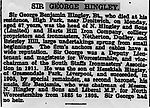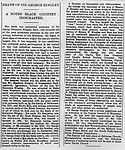Benjamin Hingley was born in 1830 and died in 1905. In 1877, when 47 years old, he succeeded his father Noah as the head of the business, and remained as sole manager until 1890.
Until 1890 the business had not enjoyed the benefits of limited liability, which had become available in 1855, and was simply known as N. Hingley & Sons. Benjamin Hingley steered the company into incorporation, and N. Hingley & Sons Ltd was born. The significance of this was twofold. Firstly, the personal wealth of the shareholding members of the family was now protected from any losses that may beset the business, and secondly, the terms of the previously unwritten “Noah Hingley Family Settlement” were confirmed by the allocation of shares in the limited liability business.
Benjamin Hingley was not only an ironmaster of international repute and guardian of the standards for which Hingley’s were world renowned, but he was also active in public life, holding the following positions:
1885 – 1895 Member of Parliament for North Worcestershire
1887 & 1888 Mayor of Dudley
1900 High Sheriff of Worcestershire
Deputy Lieutenant of Worcestershire
1893 Created a Baronet by Gladstone
In 1895 Benjamin Hingley was forced to retire from public life, and from active management of the business, by a serious illness.
George Benjamin Hingley, born in 1850, was known in the business as “Ben” Hingley, until he succeeded to the baronetcy in 1905, whereafter he is referred to as Sir George Hingley. He lost his father, Hezekiah, when he was 15, and the family moved to Worcestershire, where he attended Halesowen Grammar School. The high regard, in which his bachelor uncle held him, is indicated by the fact that he arranged for George to succeed to the baronetcy.
He travelled extensively for the firm, and set up the network of agents in the Orient and Australia, although his brother Henry subsequently did most of the foreign travel. Most of George’s travel was between the major cities of Britain, and his workaholic nature ensured he only took short holidays.
He became chairman in 1905 and concentrated share ownership in the hands of himself and his brother Henry, both bachelors. This was significant, as it meant that it would be necessary to bring in competent people from outside the family, and this would eventually lead to the dispersal of the share ownership. So from a tight-knit family firm, Hingley’s would become a business with a far wider accountability by the end of George’s life.
He took no part in national political activities, unlike his uncle and grandfather, instead using his energies on local politics and trade associations.
He was a county magistrate and an alderman of the County Council of Worcestershire. He had held the appointment of High Sheriff of Worcestershire, and at the time of his death he was Deputy Lieutenant for the county.
He held a long membership of the Midland Iron and Steel Wages Board, the body responsible for securing industrial peace in the trade for fifty years. He also served as vice-chairman of the South Staffordshire Ironmasters’ Association, which ensured fair play in industrial relations.
He died 19th August 1918, and his obituary was carried in all the national newspapers, as well as the local ones.
Like his brother, Henry Montagu Hingley never married, and dedicated his life to the business. He introduced many technical innovations to the firm, having a particularly good grasp of the techniques involved in the making of the world famous wrought iron. Netherton iron bar was a product which, although not having the high profile of the cable and anchor side of the business, was of considerable importance in the export market, where Henry’s responsibilities lay.
He died at the early age of 54 in 1909, which left his brother George with no alternative but to again bring in outsiders to help run the business, Henry having been a major shareholder.
Alfred Hilton Legge started with the firm in 1862, and was company secretary from 1890 to 1910. His particular area of expertise was in providing manufacturing schedules, the accuracy of which were the key to Hingley’s ability to fulfil its contractual obligations.
George Blakey Rumford was assistant company secretary from 1884 to 1918, although, in reality, Rumford was personal assistant to George Benjamin Hingley and a life-long confidant. And, like George, by the end of the war his health too was shattered, and he died in December 1918
George Cyril Edwards joined the firm in 1910, and was the first professional administrator to be appointed. His principle role was to manage the administration arising from the raft of financial, social and industrial legislation being brought in by the Liberal government, and to control the global network of agents employed by Hingley’s.
Cyril Edward Lloyd was brought in as a director in 1908, and went on to become the grand old man of the enterprise. He died in 1963 while still serving as president after fifty five years of service. Lloyd was a member of the Lloyds banking family but chose a career as a civil engineer and became an ironmaster of equal rank to the Hingleys. He was made a director within two years of joining Hingley’s and he became an indispensable member of the board, rising to chairman, when Sir George died in 1918. He was M.P. for Dudley from 1922 to 1929 and again from 1941 to 1945, and he was also a director of the Great Western Railway.
Rollover the captions in the box to see the available images in thumbnail format, click the caption to see the full-size image
| Reference: | 683 |
| Keywords: | |
| Archive Ref: | |
| Updated: | Mon 4 Jun 2007 - 15 |
| Interpretation written by | Louis Howe |
| Author's organisation | Curatorial |
| Organisation's website |


